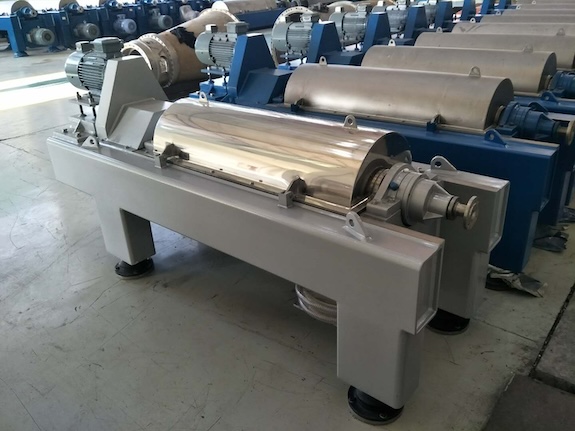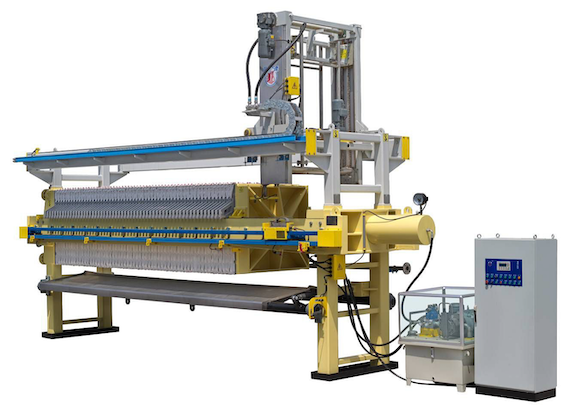Advancing distillers grains: two pathways to dewatering
By Gregory T. Benz, Benz Technology International, Inc. and Dr. Ling Du, Terrace International, Inc.
Special to The Digest
Whether used for beverage or fuel, facilities that produce ethanol from grains typically have a valuable co-product: distiller’s grains. And whether these are sold wet (WDG) or dry (DDG), it is desirable to remove as much water mechanically as possible. Two common ways of dewatering are the centrifugal decanter and the diaphragm filter press.

A decanter (Figure 1) consists of an augur/scroll rotating inside a high-speed rotating drum. The speed of each can be adjusted independently to control discharge rate and product moisture. Typical moisture content of the product is 60-70%. The dewatered product is a paste, rather than a hard cake. There are some visible solids in the centrate.

The diaphragm filter press (Figure 2) is essentially a plate-and-frame filter press with added steps and automation. After the feed flow stops, the feed valve is closed and special diaphragm plates are pressurized, squeezing out additional water. Typical cake discharge moisture for distiller’s grains is about 42-45%. If the feed slurry is at a temperature of 110F or below, a high-pressure version can be used, with a typical cake moisture of 39%. Since this is a filter, the filter cloth is able to retain most solids within the cake. There are almost no solids in the filtrate, depending on filter cloth mesh size. The ability of filter press to handle low inlet solids content feed and produce stable moisture content of cake is also welcomed by operators. For example, in gluten filtration in the corn wet milling industry the filter press can directly take light gluten to make low moisture cake in one step which saves capital and operating costs. However, these units operate in batch mode, though most plants use multiple units or a surge vessel, resulting in continuous cake flow.
In comparing the two methods, several key differences can be observed. Due to rotary friction, the decanter requires much more energy per unit of production than the filter press, and the wear rate of the components results in much more expensive maintenance than the filter cloths in the press, which are not exposed to sliding friction. We have already mentioned that the decanter does not remove as much water as the diaphragm filter press, which has a major impact on drying costs downstream of the press. The filter press can be fully automated and can include a washing step. Generally, the decanter is also much more expensive up front and more expensive to maintain. The main drawbacks of the diaphragm press are its spatial footprint and its batch operation. But the overall economics strongly favor the diaphragm press. These comparisons are summarized in table 1.

About the Authors
Gregory T. Benz is President of Benz Technology International, Inc. (www.benz-tech.com), located at 2305 S Clarksville Road, Clarksville, Ohio 45113. Phone 937-289-4504; fax 937-289-3914; e-mail g.benz@benz-tech.com. He received his BsChE from the University of Cincinnati in 1976 and has taken a course on Fermentation Biotechnology from The Center for Professional Advancement. A registered Professional Engineer in Ohio, he has over 45 years’ experience in the design of agitation systems, specializing in fermentation and bioreactors. Currently his company does general engineering, mixing and bioreactor design consultation, including equipment specification and bid evaluation. He is a member of AIChE, ISPE, SIMB, American Mensa and the American Chamber of Commerce in Shanghai. He is affiliated with Lee Enterprises Consulting Partners and acts as Sales Manager for Terrace International, Inc.
Dr. Ling Du is President of Terrace International, Inc. (www.terraceinternatioal.com), Located at 7 Allegheny Ct., Bolingbrook, IL 60400. Phone 630-487-0938; email ling.du@terraceinternational.com. She received her Ph.D. in Agricultural Engineering from the University of Illinois at Urbanna-Champaign. Her major experience is in corn wet milling and related grain processing.
Category: Thought Leadership














